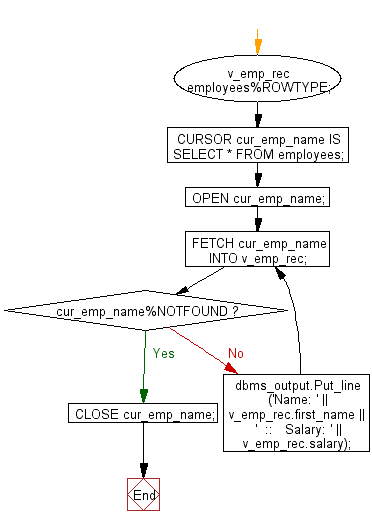PL/SQL Cursor Exercises: FETCH multiple records and more than one columns from the same table
PL/SQL Cursor: Exercise-17 with Solution
Write a program in PL/SQL to FETCH multiple records and more than one columns from the same table.
Sample Solution:
Table: employees
employee_id integer first_name varchar(25) last_name varchar(25) email archar(25) phone_number varchar(15) hire_date date job_id varchar(25) salary integer commission_pct decimal(5,2) manager_id integer department_id integer
PL/SQL Code:
DECLARE
v_emp_rec employees%ROWTYPE;
CURSOR cur_emp_name IS
SELECT *
FROM employees;
BEGIN
OPEN cur_emp_name;
LOOP
FETCH cur_emp_name INTO v_emp_rec;
exit WHEN cur_emp_name%NOTFOUND;
dbms_output.Put_line('Name: '
|| v_emp_rec.first_name
|| ' :: Salary: '
|| v_emp_rec.salary);
END LOOP;
CLOSE cur_emp_name;
END;
/
Sample Output:
SQL> / Name: Steven :: Salary: 24000 Name: Neena :: Salary: 17000 Name: Lex :: Salary: 17000 Name: Alexander :: Salary: 90 Name: Bruce :: Salary: 6000 Name: David :: Salary: 4800 Name: Valli :: Salary: 4800 Name: Diana :: Salary: 4200 Name: Nancy :: Salary: 12008 Name: Daniel :: Salary: 9000 ...
Flowchart:

Go to:
PREV : Write a program in PL/SQL to FETCH more than one record and single column from a table.
NEXT : Write a program in PL/SQL to FETCH multiple records and more than one columns from different tables.
Improve this sample solution and post your code through Disqus
What is the difficulty level of this exercise?
